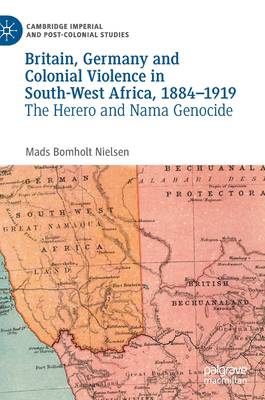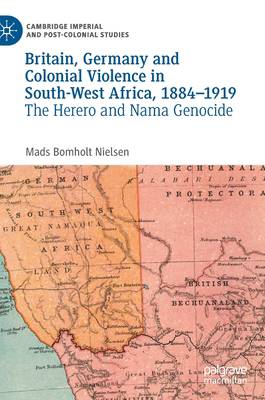
Door een staking bij bpost kan je online bestelling op dit moment iets langer onderweg zijn dan voorzien. Dringend iets nodig? Onze winkels ontvangen jou met open armen!
- Afhalen na 1 uur in een winkel met voorraad
- Gratis thuislevering in België vanaf € 30
- Ruim aanbod met 7 miljoen producten
Door een staking bij bpost kan je online bestelling op dit moment iets langer onderweg zijn dan voorzien. Dringend iets nodig? Onze winkels ontvangen jou met open armen!
- Afhalen na 1 uur in een winkel met voorraad
- Gratis thuislevering in België vanaf € 30
- Ruim aanbod met 7 miljoen producten
Zoeken
Britain, Germany and Colonial Violence in South-West Africa, 1884-1919
The Herero and Nama Genocide
Mads Bomholt Nielsen
€ 137,45
+ 274 punten
Uitvoering
Omschrijving
Reflecting emerging scholarship on the entanglement of colonial histories, this book examines British and South African perspectives on, and involvement in, the genocide of the Herero and Nama in German South West Africa from 1904 to 1908. Seeking to present a transnational and trans-colonial perspective on the war imposed by Germany, the book sheds light on Anglo-German relations during 'native' rebellions and exposes shared experiences of colonial violence. This approach aligns with a new surge of historiography which emphasises the co-operation between colonial powers to maintain order in Africa. The author focuses on British involvement in counter-insurgency efforts, its awareness of the extent of the genocide, and how the Herero-Nama War impacted colonial rule in British territory. The book sheds light on how the British government intentionally managed sensitive information on German colonialism according to the geopolitical needs: While reports were ignored and censored prior to1914, these became instrumental to Britain's foreign policy in confiscating Germany's colonies in 1919. Not only exploring the war years, the book covers the entire period of German colonial rule in Africa (1884-1919), and highlights British and South African perspectives throughout this period. Offering fresh insights on the first genocide of the century, this book builds on a growing body of research into trans-colonialism and contributes to modern German history.
Specificaties
Betrokkenen
- Auteur(s):
- Uitgeverij:
Inhoud
- Aantal bladzijden:
- 233
- Taal:
- Engels
- Reeks:
Eigenschappen
- Productcode (EAN):
- 9783030945602
- Verschijningsdatum:
- 1/03/2022
- Uitvoering:
- Hardcover
- Formaat:
- Genaaid
- Afmetingen:
- 148 mm x 210 mm
- Gewicht:
- 449 g

Alleen bij Standaard Boekhandel
+ 274 punten op je klantenkaart van Standaard Boekhandel
Beoordelingen
We publiceren alleen reviews die voldoen aan de voorwaarden voor reviews. Bekijk onze voorwaarden voor reviews.











